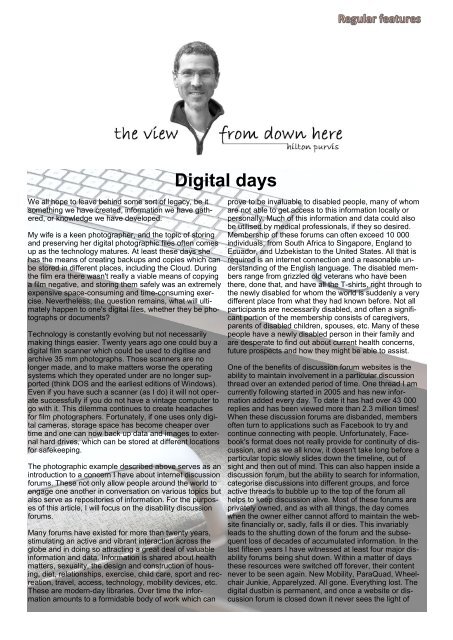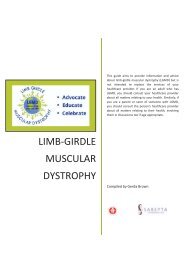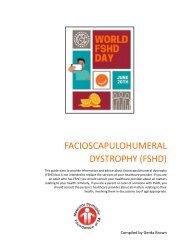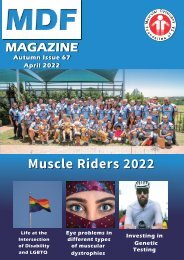MDF Magazine Issue 72 December 2023
You also want an ePaper? Increase the reach of your titles
YUMPU automatically turns print PDFs into web optimized ePapers that Google loves.
We all hope to leave behind some sort of legacy, be it<br />
something we have created, information we have gathered,<br />
or knowledge we have developed.<br />
My wife is a keen photographer, and the topic of storing<br />
and preserving her digital photographic files often comes<br />
up as the technology matures. At least these days she<br />
has the means of creating backups and copies which can<br />
be stored in different places, including the Cloud. During<br />
the film era there wasn't really a viable means of copying<br />
a film negative, and storing them safely was an extremely<br />
expensive space-consuming and time-consuming exercise.<br />
Nevertheless, the question remains, what will ultimately<br />
happen to one's digital files, whether they be photographs<br />
or documents?<br />
Technology is constantly evolving but not necessarily<br />
making things easier. Twenty years ago one could buy a<br />
digital film scanner which could be used to digitise and<br />
archive 35 mm photographs. Those scanners are no<br />
longer made, and to make matters worse the operating<br />
systems which they operated under are no longer supported<br />
(think DOS and the earliest editions of Windows).<br />
Even if you have such a scanner (as I do) it will not operate<br />
successfully if you do not have a vintage computer to<br />
go with it. This dilemma continues to create headaches<br />
for film photographers. Fortunately, if one uses only digital<br />
cameras, storage space has become cheaper over<br />
time and one can now back up data and images to external<br />
hard drives, which can be stored at different locations<br />
for safekeeping.<br />
The photographic example described above serves as an<br />
introduction to a concern I have about internet discussion<br />
forums. These not only allow people around the world to<br />
engage one another in conversation on various topics but<br />
also serve as repositories of information. For the purposes<br />
of this article, I will focus on the disability discussion<br />
forums.<br />
Many forums have existed for more than twenty years,<br />
stimulating an active and vibrant interaction across the<br />
globe and in doing so attracting a great deal of valuable<br />
information and data. Information is shared about health<br />
matters, sexuality, the design and construction of housing,<br />
diet, relationships, exercise, child care, sport and recreation,<br />
travel, access, technology, mobility devices, etc.<br />
These are modern-day libraries. Over time the information<br />
amounts to a formidable body of work which can<br />
Digital days<br />
prove to be invaluable to disabled people, many of whom<br />
are not able to get access to this information locally or<br />
personally. Much of this information and data could also<br />
be utilised by medical professionals, if they so desired.<br />
Membership of these forums can often exceed 10 000<br />
individuals, from South Africa to Singapore, England to<br />
Ecuador, and Uzbekistan to the United States. All that is<br />
required is an internet connection and a reasonable understanding<br />
of the English language. The disabled members<br />
range from grizzled old veterans who have been<br />
there, done that, and have all the T-shirts, right through to<br />
the newly disabled for whom the world is suddenly a very<br />
different place from what they had known before. Not all<br />
participants are necessarily disabled, and often a significant<br />
portion of the membership consists of caregivers,<br />
parents of disabled children, spouses, etc. Many of these<br />
people have a newly disabled person in their family and<br />
are desperate to find out about current health concerns,<br />
future prospects and how they might be able to assist.<br />
One of the benefits of discussion forum websites is the<br />
ability to maintain involvement in a particular discussion<br />
thread over an extended period of time. One thread I am<br />
currently following started in 2005 and has new information<br />
added every day. To date it has had over 43 000<br />
replies and has been viewed more than 2.3 million times!<br />
When these discussion forums are disbanded, members<br />
often turn to applications such as Facebook to try and<br />
continue connecting with people. Unfortunately, Facebook's<br />
format does not really provide for continuity of discussion,<br />
and as we all know, it doesn't take long before a<br />
particular topic slowly slides down the timeline, out of<br />
sight and then out of mind. This can also happen inside a<br />
discussion forum, but the ability to search for information,<br />
categorise discussions into different groups, and force<br />
active threads to bubble up to the top of the forum all<br />
helps to keep discussion alive. Most of these forums are<br />
privately owned, and as with all things, the day comes<br />
when the owner either cannot afford to maintain the website<br />
financially or, sadly, falls ill or dies. This invariably<br />
leads to the shutting down of the forum and the subsequent<br />
loss of decades of accumulated information. In the<br />
last fifteen years I have witnessed at least four major disability<br />
forums being shut down. Within a matter of days<br />
these resources were switched off forever, their content<br />
never to be seen again. New Mobility, ParaQuad, Wheelchair<br />
Junkie, Apparelyzed. All gone. Everything lost. The<br />
digital dustbin is permanent, and once a website or discussion<br />
forum is closed down it never sees the light of

















